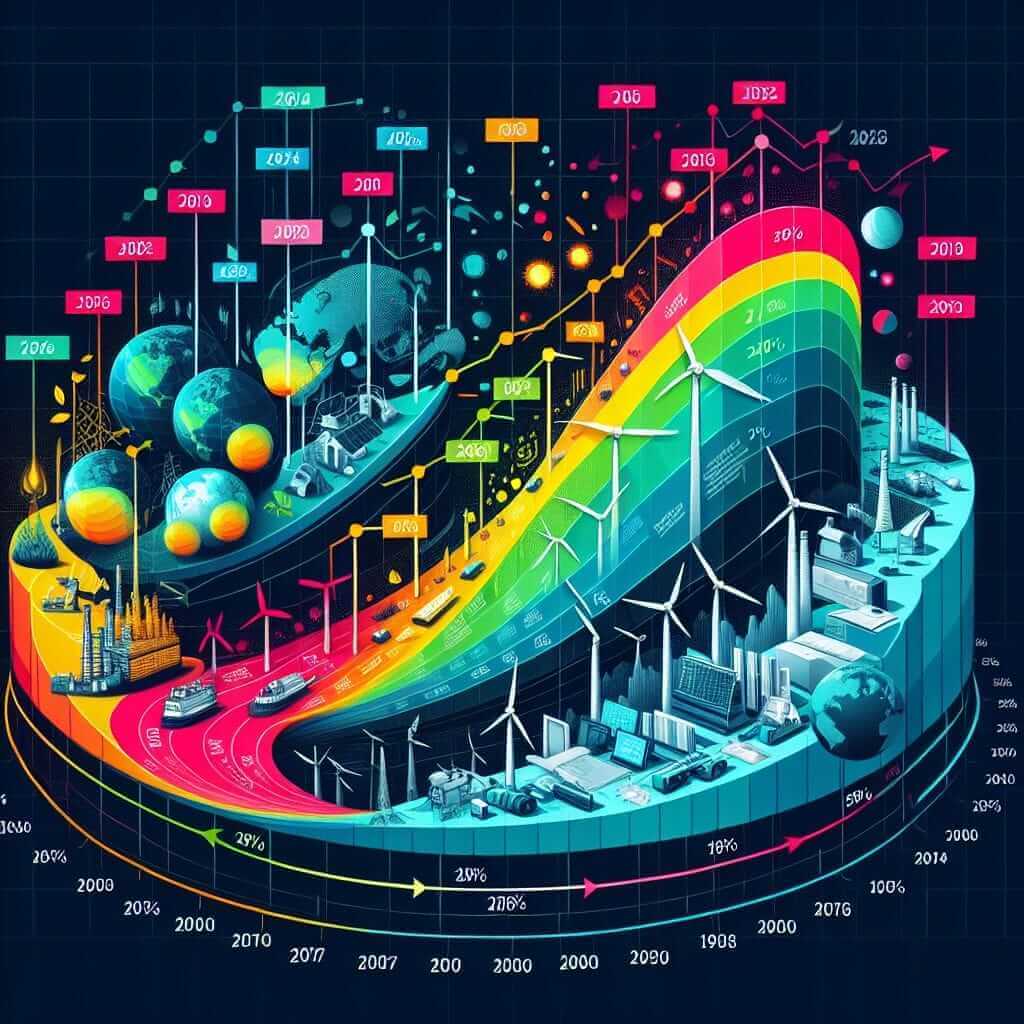The IELTS Reading section tests your abilities in reading comprehension and understanding of English texts. It’s essential to stay updated with current topics, as many of them could appear in your exam. One such relevant and increasingly significant topic is the impact of renewable energy adoption on the global oil market. This article explores this subject, offering you a practice reading passage and comprehensive reading questions to help you hone your skills. Given the ongoing debates and international focus on climate change and energy resources, this topic has consistently appeared in various forms in past IELTS exams. Understanding it will not only prepare you for the IELTS but also enrich your knowledge of a critical global issue.
Practice Reading Passage
How Renewable Energy Adoption is Changing the Global Oil Market
Over the past two decades, the world has seen a significant shift towards renewable energy sources such as solar, wind, and hydropower. This transition is driven by the need to reduce carbon emissions, combat climate change, and achieve energy independence. However, the increasing adoption of renewable energy also has profound implications for the global oil market.
Renewable energy is fundamentally altering demand dynamics in the oil industry. As more countries invest in renewable technologies, the reliance on oil imports decreases. This shift is particularly noticeable in regions like Europe and North America, where stringent environmental regulations and substantial governmental incentives promote the use of clean energy. Consequently, oil-exporting countries, particularly those in the Middle East, face decreasing demand and fluctuating oil prices.
Furthermore, technological advancements in energy storage and efficiency are expediting the transition from fossil fuels to renewables. Innovations like battery storage systems and smart grids ensure a more stable and reliable supply of renewable energy, reducing the dependency on oil-based power plants. This technological evolution decreases the volatility traditionally associated with renewable energy sources.
The economic implications of this transition are multifaceted. For oil-producing nations, shrinking demand translates into reduced revenue and economic instability, potentially triggering social unrest in regions heavily reliant on oil exports. Conversely, countries leading in renewable energy adoption experience job creation, technological innovation, and increased investment in local economies.
In addition to economic and environmental impacts, the geopolitical landscape is reshaping. Historically, control over oil resources has been a significant factor in international relations and conflicts. However, the rise of renewable energy could decentralize power and reduce geopolitical tensions associated with oil dependence.
Despite these promising trends, the pace of renewable energy adoption varies. Some countries, particularly developing nations, still depend heavily on oil due to limited infrastructure and financial constraints. Consequently, the global oil market continues to play a crucial role in economies worldwide, although its dominance is gradually waning.
In conclusion, the adoption of renewable energy is significantly impacting the global oil market by altering demand, fostering technological advancements, and transforming economic and geopolitical landscapes. While challenges remain, the continued shift towards renewable energy heralds a more sustainable and stable global energy future.
 Impact of Renewable Energy
Impact of Renewable Energy
Reading Questions
Multiple Choice
-
What is one of the main reasons for the shift towards renewable energy?
a) Increase in oil prices
b) Need to reduce carbon emissions
c) Decrease in technological advancements
d) Economic instability -
How are technological advancements influencing the renewable energy transition?
a) By reducing the investment in smart grids
b) By increasing the volatility of renewable energy supply
c) By ensuring stable and reliable supply of renewable energy
d) By hindering the development of storage systems
True/False/Not Given
-
The increasing adoption of renewable energy has led to a significant decline in the demand for oil in Europe and North America. _____
-
All countries are adopting renewable energy at the same pace. _____
-
Oil-exporting countries have experienced economic growth due to increased renewable energy use. _____
Matching Information
-
Match the following impacts of renewable energy adoption with their descriptions:
a) Economic implications
b) Technological advancements
c) Geopolitical impacts
d) Environmental benefits- Innovations like battery storage systems and smart grids
- Reduced revenue for oil-producing nations
- Decentralization of power and reduced geopolitical tensions
- Reduction in carbon emissions
Answer Key and Explanations
Multiple Choice
-
b) Need to reduce carbon emissions
- Explanation: The passage emphasizes that the shift towards renewable energy is driven by the necessity to cut down carbon emissions and combat climate change.
-
c) By ensuring stable and reliable supply of renewable energy
- Explanation: Technological advancements, such as battery storage systems and smart grids, have played a crucial role in ensuring the stable and reliable supply of renewable energy.
True/False/Not Given
-
True
- Explanation: The passage mentions that regions like Europe and North America have seen noticeable decreases in oil imports due to renewable energy investments.
-
False
- Explanation: The passage states that the pace of renewable energy adoption varies, with some developing countries still heavily dependent on oil.
-
False
- Explanation: The passage outlines that oil-exporting countries face reduced revenue and economic instability due to shrinking oil demand.
Matching Information
-
- b) – Innovations like battery storage systems and smart grids
- a) – Reduced revenue for oil-producing nations
- c) – Decentralization of power and reduced geopolitical tensions
- d) – Reduction in carbon emissions
Common Mistakes and Tips
Common Mistakes
- Misinterpreting the data and context of the passage.
- Failing to identify keywords and their synonyms in the text that match the questions.
- Rushing through the passage without understanding the overall gist.
- Poor time management while answering detailed comprehension questions.
Tips for Success
- Skim and Scan: Skim the passage to get a general idea first, then scan for specific information to answer the questions.
- Identify Keywords: Focus on keywords in the questions and locate their synonyms in the text.
- Practice Time Management: Practice with a timer to ensure you can complete sections within the given time.
- Understand the Question Types: Familiarize yourself with different types of IELTS reading questions and strategies to tackle them.
Vocabulary
- Reliance (n) /rɪˈlaɪəns/: The state of depending on something.
- Example: The reliance on oil imports decreases with renewable energy adoption.
- Volatility (n) /ˌvɒləˈtɪlɪti/: The quality of being subject to frequent changes.
- Example: Technological advancements reduce the volatility of renewable energy supplies.
- Geopolitical (adj) /dʒiːəpəˈlɪtɪkəl/: Relating to politics, especially international relations, as influenced by geographical factors.
- Example: The geopolitical landscape is reshaping due to renewable energy adoption.
Grammar Focus
Complex Sentences
Structure: Main Clause + Subordinate Clause
- Example: As more countries invest in renewable technologies, the reliance on oil imports decreases.
Subject-Verb Agreement
Rule: The subject must agree with the verb in number (singular/plural).
- Example: Technological advancements are expediting the transition from fossil fuels to renewables.
Conclusion
The shift towards renewable energy has profound implications for the global oil market, affecting demand, economy, technology, and geopolitics. For your IELTS Reading prep, mastering this topic helps you stay updated with current global issues and enhances your comprehension skills. Practice regularly, focus on understanding the passage structure, and effectively manage your time for the best results. Happy studying!

